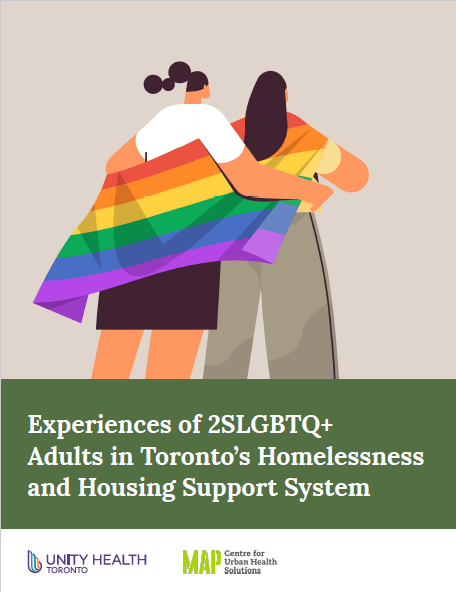Adult members of the 2SLGBTQ+ community are disproportionately represented among those experiencing homelessness. This is the case in Toronto, where 10-12% of people experiencing homelessness self-identify as being a member of the 2SLGBTQ+ community whereas only 6% of Toronto’s general population above the age of 18 self-identifies as gay, lesbian or bisexual. However, there remains a lack of resources for 2SLGBTQ+ adults experiencing homelessness and little research has examined homelessness within this population. This report offers findings from a qualitative study which sought to better understand the lived realities of 2SLGBTQ+ adults with experiences of homelessness in Toronto.
How we studied this
Participants with lived experiences of homeless were recruited from housing programs and services, which served as community partners for the project. This report shares results from in-depth interviews conducted with 2SLGBTQ+ adults with lived experience of homelessness in Toronto and frontline staff. Findings are arranged by themes and are followed by several recommendations for program policy, network- and community-building, staff, resource sharing, and systems-level changes.
Why this is important
The overrepresentation of 2SLGBTQ+ individuals among those experiencing homelessness highlights the need for safe, accessible, and culturally humble service organizations. This report contributes to the sparse literature on 2SLGBTQ+ adult homelessness within the Toronto context.
Currently, of the city’s 49 emergency shelter locations, only two are listed as being specific to the 2SLGBTQ+ community. Previous research has demonstrated the myriad challenges that 2SLGBTQ+ people experiencing homelessness face in shelter contexts that are not specific to those who identify as 2SLGBTQ+. Without access to safe and supportive housing options, unhoused 2SLGBTQ+ people are likely to avoid shelter environments, prolong their time spent unsheltered, and face other poorer housing outcomes.
This report provides valuable perspectives from 2SLGBTQ+ adults who have experienced homelessness in Toronto. Topics include:
- Entries into homelessness
- Service use experiences at sites not specific for 2SLGBTQ+ adults
- Service use experiences at sites specific for 2SLGBTQ+ adults
- Experiences specific to recent immigrants
- Staff member perspectives
Understanding the perspectives of 2SLGBTQ+ adults with experiences of homelessness is critical for informing inclusive and equitable policies and practices.

